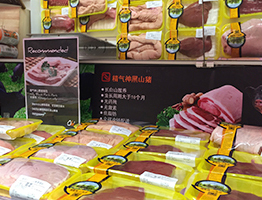Trust – the key to organic export to Asia
The demand for organic food products is on the rise – also in developing countries. Especially organic products from developed countries are in demand since they represent trust and credibility. This is an opportunity that Danish organic exporters should seize.

The aim of the Organic RDD2.2 project SOMDwIT is to investigate how ”Made in Denmark” compares to, for instance, ”Made in Japan”.
The study focuses on imported organic food products in five different countries – one of these being Thailand. The study applied in-store interviews, focus groups and a survey.
Consumer perception of imported organic food products
The results show that organic consumers in Thailand, overall, prefer to buy food products from Thailand, which, in general, is also the case when asking consumers in developed countries: Consumers prefer domestic products.
However, Thai consumers have greater trust in certification and organic standards from developed countries compared with their own country (and developing countries in general). Therefore, they primarily prefer imported organic products from developed countries.
Overall, Thai consumers do not know much about Denmark, but at the same time, Denmark has high credibility as an organic producer, only surpassed by Japan. Thai consumers perceive Japan as most credible, while China is perceived least credible.
Trust is the keyword
If you are an exporter and are planning to export to a new market such as Thailand, it is crucial to know what affects and matters to consumers when choosing between organic products from different countries. Among other things, the study has established that credibility and trust play a key role – even when knowledge about the exporting country is limited.
Developed countries, with trustworthy and solid institutions to ensure high and credible organic standards, have a competitive advantage on the world market. This is also the main reason why they can compete with the cheaper products from developing countries. This is confirmed by Ejvind Pedersen who is a senior consultant for organic food in The Danish Agriculture and Food Council, and who sits on the project's steering committee. He estimates that Denmark's status as a developed country with credible organic standards and solid certification bodies can offer a competitive advantage:
"When even in Thailand Denmark is known for its strong traditions of organic production, trustworthy control bodies and high trust, Danish organic exporters should exploit this position more”.
The project therefore recommends that Danish exporters try to export to the Thai market – and other Asian markets – focusing on Danish organic products being safe as this is associated with high quality and sound, solid and trustworthy organic standards.
Professor John Thøgersen and associate professor Jessica Aschemann-Witzel are also part of the international research project ”Sustainable Organic Market Development with International Trade”. The project is part of the Organic RDD 2.2-programme, coordinated by ICROFS (International Centre for Research in Organic Food Systems) and has received funding from GUDP (Grønt Udviklings- og Demonstrationsprogram under the Ministry of Environment and Food of Denmark). The project started January 1, 2016 and ends December 31, 2017.